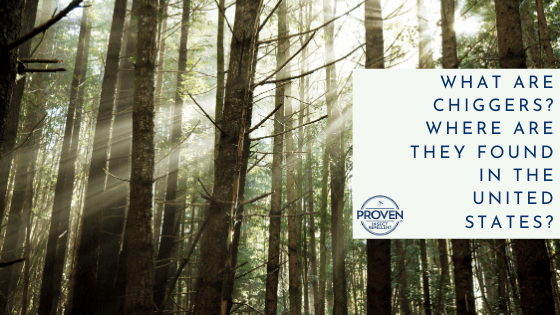Ticks are not the only pests to worry about when you go outdoors. In certain areas, you also need to watch out for chiggers. Protect yourself from this nuisance and potential danger by learning how to identify chiggers and where to be the most careful to avoid them.
What Are Chiggers?
Chiggers (scientific name: Trombiculidae) are a family of insects that go by many different names: harvest mites, scrub-itch mites, red bugs, and berry bugs. They can be reddish-orange, yellow, or straw and, at around 0.3-1 mm in length, are so tiny you often need a magnifying glass to see them.
Chiggers will typically crawl up your shoes while you’re walking through nature and climb up your leg to attach to your skin in an area where your clothing fits particularly tightly against your body, like around your underwear’s elastic edges or at the top of your socks.
When a chigger bites you, it first uses its sharp claws to make holes in your skin, then injects irritating saliva that softens the surrounding cells. Typically, you’ll develop an itchy rash in the area afterward.
Once a chigger bites you, it usually does not remain on your body for long. Chiggers usually only stay on the body for a few days, at most.
Where Are Chiggers Found in the US
Chiggers prefer the edges of forests and other damp, wooded, and grassy areas. Other common habitats for chiggers include:
- Fields
- Meadows
- Lawns
- Gardens and flowerbeds
- Lake and stream beds
You can find them throughout the world, but they are most common in the south, southeast, and midwest in the US. Chiggers are particularly active between early spring and early autumn. They become less active after the season’s first frost. Their preferred temperature range is from 77 to 86 degrees Fahrenheit, and they die when temperatures fall below 42 degrees.
Chiggers typically live in large groups clumped together on grass and leaves until an animal or person to which they can attach walks by. Chiggers can fly, but chigger hatchlings cannot, and they tend to stay close to the nest unless traveling with the group.
Hikers, hunters, and campers are at a particular risk of chigger bites, although you could also get bitten by chiggers in parks and, even, your backyard.
To protect yourself from chiggers, always wear a bug and tick repellent whenever you go out into nature. Proven Repellent is an insect repellent that is effective at repelling chiggers for up to 8 hours. Use with confidence on the whole family. Besides repelling chiggers and ticks, Proven Repellent also repels biting flies, mosquitos, and other biting insects.


Recent Comments